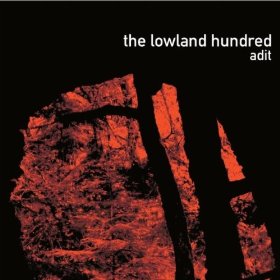Adit is an old English word for an opening or passage, specifically into a mine. Originally, an alternative spelling was ‘audit’, and though this is completely coincidental, it’s appropriate for this album, which acts as both a metaphorical crack through which we can glimpse the lives and thoughts of a cast of ordinary, near-anonymous characters, and as a kind of census of these same folk, sampling random but somehow representative moments of their day-to-day existence, and crafting these fragments into a poignant, affecting whole.
The Lowland Hundred are Paul Newland and Tim Noble, and their debut release, last year’s Under Cambrian Sky was a loose, psychogeographical concept album about their hometown of Aberystwyth. Not necessarily the most promising of prospects, but the results were ravishing: a collage of found sounds, natural and mechanical, mixed in with spare, plaintive melodies and Newland’s astonishingly expressive voice, bearing comparison with Robert Wyatt, Kevin Ayers and even Scott Walker. On first listen, Adit is a more conventional record; the field recordings take a back seat in favour of what initially appear to be more traditional song structures, with the duo joined by Sam Christie on brushed drums and Kate Woodward on ukulele. But like its predecessor, several focussed listens are required for Adit to yield up its full share of riches.
It opens with ‘The Hushing’, a gorgeous piano ballad that’s a vehicle for Newland’s high, tremulous voice, evoking the ghostly presence of long-vanished Welsh mining communities, with a melancholic jazz touch that’s redolent of Chet Baker or Mark Hollis. But it’s the lengthy second track that’s the album’s centrepiece. ‘Scree / Talus’ is closer to the extended, impressionistic sound paintings of their debut, with fragmentary lyrics picking out lives and memories in a myriad of different voices, as scattered and forsaken now as the small, broken pieces of stone and minor debris at the base of a scoured hillside. Like TS Eliot scored by latterday Scott Walker, it’s a series of poignant vignettes, significant only in their common insignificance; their ordinariness, their universality, the fact that they are all that make up a life. Lie still for me," Newland sings, "Please keep still for me." And later, "Come to me… please make love to me." Raw, uncomfortable territory, certainly, but The Lowland Hundred deserve all credit for taking us there, and holding steady throughout. And such an ambitious musical piece is all the more effective for sounding so deceptively understated; the feeling of an improvised doodle concealing the mastery of line and space within.
The haunting ‘Gentleman’s Walk’ leads into the briefest of piano instrumentals, ‘Mariamne’s Garden,’ a handful of notes arranged in velvet space, before the musical nature walk of ‘Rest Harrow,’ where the barest instrumental textures support the rambling melody of Newland’s voice as it wanders through bird song and sounds of distant human activity, as though hearing the ghosts of children who once picked fruit from the hedgerows. "Mottled pug, feathered thorn, double-square spots and black and brown hairstreaks," Newland sings, more than meeting the challenge of investing such stanzas with an emotional charge. Similarly on the spare yet luxuriant ‘Dog’s Mercury,’ Newland’s rich, fluid voice knits a song together from ambient drones, prickling interjections of guitar and cymbal, and lyrics like "in shady woodland / mercurialis perennis / little green flowers growing on spikes." But this is also the story of watching a friend succumb to alcoholism: "I watched as she crawled up the steep hanging steps… I watched as she drank herself right up to death."
It’s an occupational hazard in these communities that history and commerce have left behind. ‘Salt Water Bathing’ recollects the days when summer bought visitors to a faded seaside town to take the waters for their health: "Hippocrates saw benefits / to floating out past fishing nets / and diving down / salt water bathing." Yet out of season, this association with health seems incongruous, as the town pulls down the shutters and seeks oblivious sanctuary from winter: "This November night, we’ll drink till we see / a January morn / a February morn."
If Under Cambrian Sky conjured spirits from the open air, then Adit looks to the earth, leading us into a hidden world just beneath the surface of our own, but running deeper than we could fathom. An album about people and place, it’s nevertheless universal; in its yearning for our fragmented lives to somehow become whole again, and for nature to heal our psychic wounds as effectively as she recovers the scars we once cut deep into her soil.


